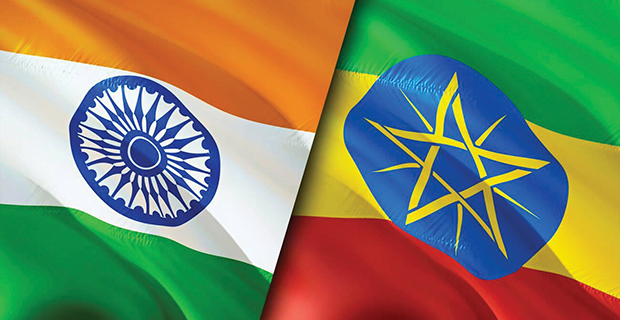Ethiopia-India Partnership
Ethiopia and India are among the world’s ancient civilizations, alongside countries such as Greece, Egypt, China, etc. Trade flourished between Ethiopia and India for more than 2,000 years of recorded history. Ethiopian traders imported silk and spices from India while exporting gold and ivory.
Following independence of India, a goodwill mission led by Sardar Sant Singh was sent to Ethiopia, further strengthening the bonds between the two countries. In 1948, diplomatic relations were established at the legation level, and by 1950, full diplomatic relations were established. Ethiopia was the first African country to open an embassy in New Delhi, India, highlighting the significance of the bilateral relationship.
Among the high-level visits, one unforgettable visit was Emperor Haile Selassie’s three-week stay in Kerala, where he fell in love with the region. This growing admiration for India was further reflected in the presence of Indian teachers in Ethiopian high schools and Universities, who played a vital role in building a modern education system by educating young Ethiopians. Educational cooperation came to an end during the Derg regime; however, the reformist government of Ethiopia is revitalizing these ties. In terms of cultural relationships, since the 1950s, young Ethiopians have grown up watching various Indian movies, such as Mother India and Waqt. Over time, this connection has grown to encompass cooperation in various multilateral initiatives, education and capacity building, investment, trade as well as cultural cooperation.
Ethiopia and India collaborate on various multilateral platforms, particularly within the United Nations, to promote inclusivity and support each other’s agendas of mutual interest. The historical achievement of Ethiopia and India in the formation of the Non-Aligned Movement (NAM) has served as a guiding principle for both nations up to now. The notable endeavor of Ethiopia and India during this time of paralysis in the international order reflects their aspiration to reform and democratize the United Nations system. As Ethiopia is a core state in Africa and a pillar of peace and security on the continent, aspires to join the Security Council as a permanent member. Ethiopia is also aware of India’s efforts to do the same in representing Asia. The two countries are also engaged in South-South Cooperation, focusing on addressing common development challenges and fostering sustainable development. India’s support for Ethiopia to join BRICS further underscores the strength of this relationship, reflecting their shared commitment to mutual progress. BRICS serves as a crucial platform for developing countries to renew multilateralism, making it more inclusive and equitable to better reflect the legitimate interests of the Global South.
The relation between the two countries is further strengthened by vibrant people-to-people ties, nurtured through educational exchanges, business partnerships, and cultural activities. Ethiopian students pursue higher education in India, gaining skills and expertise that they bring back to Ethiopia. Additionally, Indian professionals work in Ethiopia, contributing to the healthcare, education, and technical sectors. These exchanges create lasting connections between the people of both countries, fostering a strong foundation for continued collaboration.
A cultural agreement signed between Ethiopia and India in 1983 laid the groundwork for decades of rich cultural exchange. Over the years, various delegations have traveled between the two countries, showcasing traditional arts and fostering mutual appreciation. Most recently, in 2024, a 20-member Ethiopian troupe from the National Theater participated in the 37th Surajkund International Crafts Mela, held from February 2 to 18 in Faridabad, Haryana, India. The delegation showcased Ethiopia’s rich cultural heritage through traditional dances, music, unique handicrafts, handloom products, and clothing. The only cultural center from the African continent will open soon in December 2024. In addition, the Ethiopian Cultural Center, the only cultural center from the African continent, is set to reopen in December 2024, further enhancing cultural ties and exchanges between Ethiopia and India.
Ethiopia and India have established strong trade relations, with bilateral trade reaching USD 2.8 billion in 2022. Ethiopia’s exports to India were approximately USD 80 million. Furthermore, India was the second-largest exporter to Ethiopia in 2022-23, with bilateral trade valued at USD 642.59 million. A trade agreement, signed by the two countries in 1997 provides for the establishment of a Joint Trade Committee (JTC) and meetings are held from time to time. The sixth Joint Trade Committee meeting was held at the level of Director General/Joint Secretary in Addis Ababa on November 6, 2023. The Ethiopian Minister for Trade and Regional Integration attended the inaugural session. Both sides conducted a comprehensive review of their bilateral trade and acknowledged the significant potential for expanding and diversifying the trade basket. They agreed to cooperate in the sectors of standardization and quality assurance, finance, pharmaceuticals, automobiles, renewable energy, and agriculture and food processing.
There needs to be cooperation between the governments of Ethiopia and India to realize this objective in a timely manner. India is the most populous country in Asia and the world, while Ethiopia is the second most populous country in Africa. The annual economic growth of the two countries, endowed with abundant natural resources, is almost similar at 7% and above. These two sleeping giants of Africa and Asia have a bright future for cooperation in trade, IT, technology transfer, finance, education, and more. While there is a will and much is being done, we are not yet there to fully exploit our potential.











Comments.